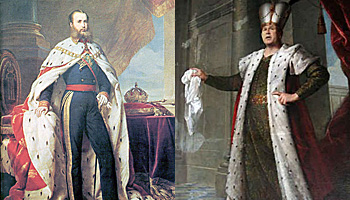 |
 |
 |
 Editorials | December 2006 Editorials | December 2006  
Doing the Right Thing in Los Tres Palos
 Campbell Webster - The Guardian Campbell Webster - The Guardian


| | Both Maximilian I and Bush II appear to have concluded that their own system of government is what the invaded country required. |
About 140 kilometres south of the U.S. border on Mexico's east coast sits the community of Los Tres Palos, Spanish for The Three Sticks. A hot, arid and impoverished community, Los Tres Palos is more graveyard than town, with its patchwork of brightly coloured tombstones surrounding and vastly outnumbering its 300 inhabitants.

Los Tres Palos is not unique; rural Mexico is dotted with hundreds of villages that share its slow-moving melancholy, where it seems the best paint jobs are saved for your final residence.

What distinguishes Los Tres Palos is how and why it was founded in 1867. Maximilian the First of Mexico, an Austrian who in 1864 was sent by the French and the Austrians to be the imposed Emperor of Mexico, had just been soundly defeated by Mexican armies led by Benito Juarez. A few hundred of his Austrian mercenaries, isolated, deserted and with no way back to Austria, fled for their lives to the Mexican countryside, ultimately founding the community of Los Tres Palos.

Looked at through the prism of history, the whole thing seems remarkably silly. Napoleon III of France, along with Mexican monarchists, believed sending Maximilian was for the good of Mexico and the world: What the people of Mexico needed was an emperor, the Mexican monarchists concluded, and not one of their own, but somebody with experience, like an Austrian noble.

Fully focused on the lofty goals of the value of royalty to the Mexican nation, Maximilian spent his initial voyage to Mexico writing a manual of court etiquette, rather than studying the books on Mexico which had been offered to him.

The present day U.S. invasion of Iraq may one day look just as ridiculous as Maximilian's short-lived rule. For they are striking in their similarity: Both Maximilian I and Bush II appear to have concluded that their own system of government is what the invaded country required. While this idea seems simply arrogant on one level, its ignorance is more troubling. We might like to think that the U.S. government in the present day has at least a base level of sophistication in understanding the world. Yet an entire government (not just Bush II) set about to impose a western-style democracy on a country where none had existed before. Maybe next time they will send an Austrian noble.

Bringing change to the world is never a simple matter, even when our intentions are the best. No doubt Maximilian I and Bush II believed they were changing the world for the better, as Bush himself has said, on many occasions, when describing the invasion of Iraq.

But such a belief in our role as positive actors is not confined to our leaders; it extends throughout most peoples, including much of the western world at Christmas time. We all believe in doing ‘the right thing’, but perhaps spend little time evaluating whether we really know what that is.

Witness our ritualistic celebration of our own good deeds at Christmas time, including such initiatives as the CBC Turkey Drive, which invariably concludes with confirmation that we are a good people and a good Island doing good things.To be sure, our intentions are sound; but they would be better carried out if they were accompanied by an analysis of why turkey drives are even necessary.

While it may seem a long trip from a turkey drive to misadventures in Baghdad and Los Tres Palos, it is really all part of the same malaise. Good intentions are not enough, and perhaps not even the point. American citizens, on average, give almost triple the amount to charity that Canadians and Islanders do, yet at 26 per cent, the U.S. has the second-highest rate of childhood poverty in the industrialized world. Contrast that with the Czech Republic or Sweden, where child poverty sits at less than five per cent.

In the end, acting on our charitable instincts may be only a small part of what is important. Bringing a great deal of humility and inquiry to our efforts to change our communities and the world is perhaps where the real work must be done.

Including in some rural Mexican villages, like Los Tres Palos. | 
 | |
 |



